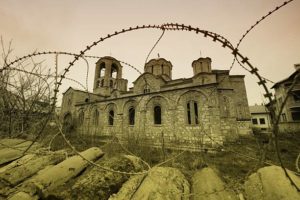Where are we headed as a society?
What are our options for our future? It seems on the one hand that we are heading towards a centralized totalitarian system which will absorb all of humanity. It’s benefits are greater security to the life of the human body, but an emptiness of the human soul. Is the only other option to this a return to a tribalistic society in which immorality is given free reign and petty conflict subsumes the better parts of man?
Perhaps there is wisdom in the aphorism that the good is somewhere in the middle of the two extremes. With that in mind, this work is a look at the two extreme ends of social development (as envisioned by the author) with the hope of being able to take from them a middle ground between them (taking the best of each and rejecting the worst) that may lead to a better good. I would like to think we can find a middle ground between these two that is an improvement, but exploration of that is a topic for another day.
Monotheism

There is one system. Each person is born into it, and they cannot change it, hope of changing it, or even conceive of such thing as change. The life of the body is secure, the life of the spirit devoid.
The appetitive needs of the individual are met by the system completely, and in exchange the individual must completely conform to the rules and norms of the system. In this scenario, human life is safe, but sterile. The system has determined what each individual needs and views any deviances from their assessment of needs as aberrations that need to be corrected. In this system, the individual barely exists, and the collective human organism is supreme. There is limited to no possibility of experimentation and trials of different ways of life, and errors in the system may not be correctable.
A life under this system may be something like the following: A child is born (or until an ex-utero gestation process is developed that supplants human birthing) and is entrusted to the system for its raising. A worldview based on the system is imparted to the child, with uniform testing throughout to determine levels of conformity and loyalty to the system. Determination of prestige and power is derived solely from the system (and largely from these tests) rather than from an aggregation of peers. The value of human life is solely utilitarian, and the system breeds people to fit needs within the system (including a very large reserve element of people whose function is to sit at the ready in case there is ever a need). Decisions of who may procreate are determined by the system as is the death of individuals based on a cost benefit analysis.
Pros:
- System is stable and safe; every individual would have reasonable expectation of preservation of body
- Recognizes that we share one Earth, and that actions upon it may engender all of us
Cons:
- Individuals have limited rights and ability to pursue their interests
- Assumes a god like knowledge of the good in life; since humans do not actually have this knowledge, the system will be inherently flawed, but very difficult to fix
- Limited to no trial or experimentation; no meaningful options; potential for systemic flaws to endanger all of humanity
Anarchy (or Tribalism)

There are as many systems as there are desires. There is no central power capable of controlling these, and in the absence of control anything goes. Conflict is endemic to life, and accordingly life might be short, nasty, and brutish. The life of the spirit has potential, but the life of the body is at risk.
The appetitive needs of the individual are met the individual or xes group. In this scenario, life is free and meaningful, but chaotic and uncertain. No recognition is given by other groups to prestige or virtue that they do not themselves agree with, and therefore all prestige is only won through contest (with the potential destruction for the many that such conflict entails). In this system, the individual reigns supreme, and the collective good is limited solely to the temporary alliances with others that may help oneself. Options for modes of life are plentiful, but all may be overrun by the capriciousness of others.
A life under this system may be something like the following: A child is born (or individual groups determine ways to replicate human based off their own experimentation). There is no accepted structure for this, so children may be considered of no worth (and used in trials or sold) whereas others may have more traditional upbringings. Each child would be had to support the desires of the individual or group, and would be raised to those diverse purposes. Some groups may consider human life worthless, others utilitarian, others mystic, spiritual, or miraculous. Without a controlling authority, life of any individual or group may be ended by the actions of others (intentionally or unintentionally). Choices of procreation and death are decentralized, with the potential for misery and suffering of the body.
Pros:
- This scenario allows choice of the individual to pursue their beliefs (which theoretically could maximize the overall human good)
- This scenario recognizes the limits of human knowledge, and allows for experimentation and observation of the good
Cons:
- The life of the human body is less assured and may be more miserable (higher odds of starvation, sickness, or torture)
- Potential for life to become more brutish and animalistic, or for wide scale conflict to endanger all of humanity
- Without a consensus on the need for diversity, may devolve over time into a single monotheistic system anyways